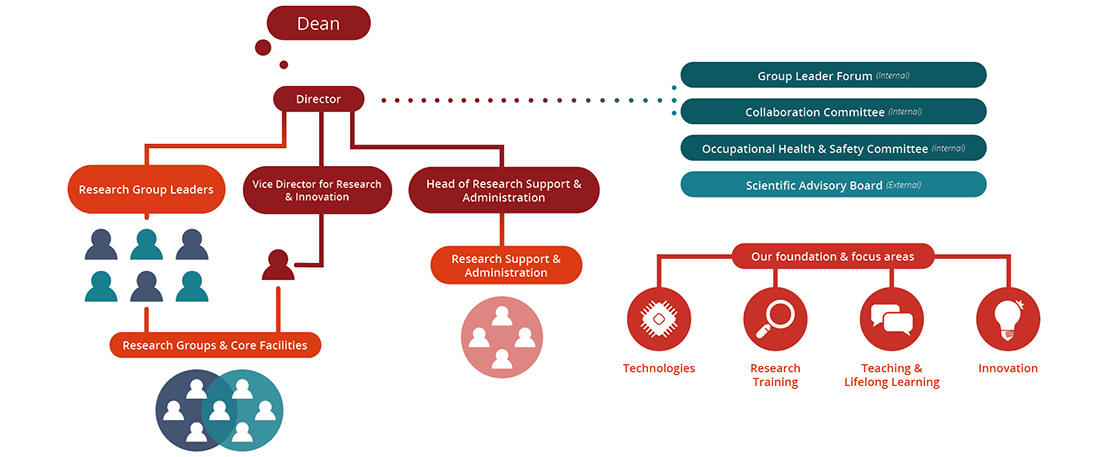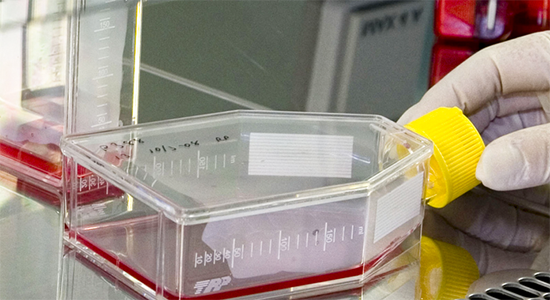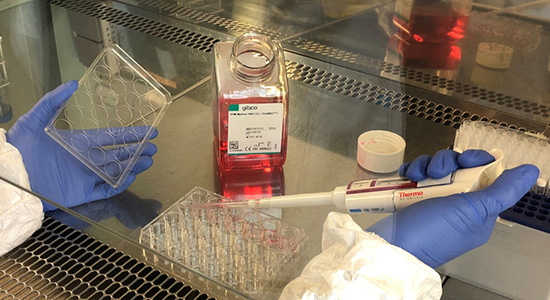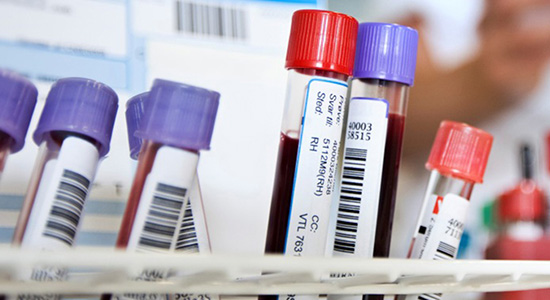The Finsen Laboratory is a basic cancer research department. We elucidate mechanisms of cancer initiation, maintenance and metastasis with the aim to identify biomarkers and novel targets for therapeutic intervention.
About BRIC
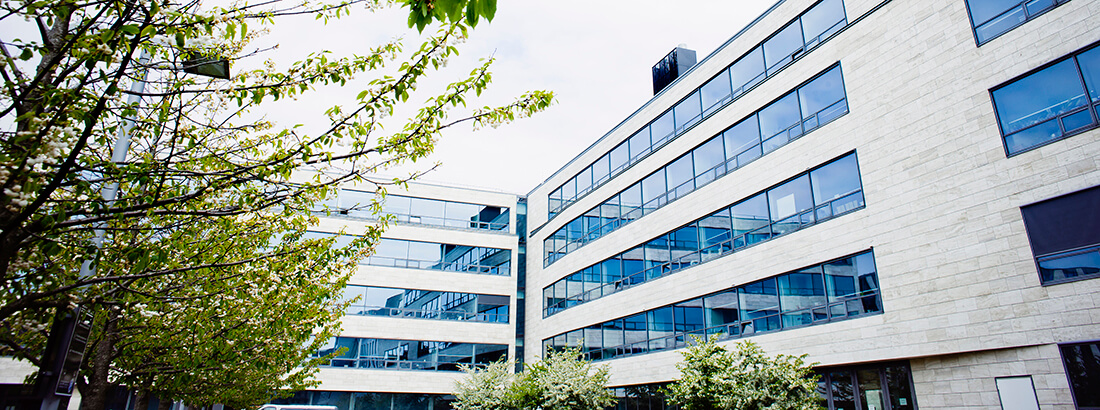
Mission
BRIC’s mission is devoted to biomedical research, primarily within cancer and neurological diseases.
Our goal is to contribute to a basic understanding of how and why disease occurs, to discover new disease-related genes, potential targets and biomarkers, in order to provide more efficient treatments for patients.
Aim
Our main aims are to:
- Perform cutting-edge basic biomedical research in an open and diverse environment fostering interdisciplinarity and collaboration
- Offer outstanding research training of young scientists
- Translate research findings into societal value
Organisation
The management team is responsible for daily management, execution of the BRIC strategy and communication with stakeholders.
Executive Director
Vice Director of Research and Innovation
Head of Research Support and Administration
Teaching and Life Long Learning is responsible for BRIC's teaching activities and outreach acitivites.
Head of Teaching and Life Long Learning
Our aim is to provide the framework and infrastructure for the world class research and training carried out at BRIC, by offering timely and effective services and support to our scientists.
We ensure coherent and relevant support through direct dialogue with our researchers, covering both academic and operational support, including pre- and post-award support, researcher training, teaching and outreach activities. Our team also carries out leadership support and project management of major research and research-supportive programs.
Front office services, purchasing, laboratory support and safety coordination provided by the team allow for BRIC’s research activities to run efficiently.
Our team counts members with different professional backgrounds within research, teaching, communication and administration. In addition, partners and advisors from the university’s joint administration provide services within finance and communication and are regularly present at BRIC to offer personal service to our employees.
The Group Leader Forum at BRIC discusses strategies, initiatives and challenges with a focus to maintain and further develop BRIC as a dynamic research and work environment.
The Group Leader Forum meets once a month and agenda and minutes are open. Participants are the
- Director of BRIC
- Director of the Finsen Laboratory
- BRIC Research Group Leaders,
- Finsen Laboratory Research Group Leaders
- Head of BRIC Administration
- Head of BRIC Strategic Research Support
The role of BRIC’s Scientific Advisory Board (SAB) is to provide scientific advice for our group leaders in terms of development of their research strategy and programme, funding, scientific leadership and collaboration efforts.
The SAB also advises BRIC’s director in matters related to BRIC’s overall research focus, infrastructure and management.
The SAB visits BRIC every other year where they interview and provide feedback for one third of the group leaders and the director.
The SAB consists of five outstanding international scientists, with expertise in the scientific areas of BRIC. Gender balance in the board is pursued. The SAB members are appointed for a period of five years. In 2025, the following members were appointed:
- Prof. Anne Willis, Director of MRC Toxicology, Univ. of Cambridge, UK (Chair)
- Prof. Simon Cook, Director of Babraham institute, Cambridge, UK
- Prof. Monica Bettencourt, Gulbenkian institute, Portugal
- Prof. Michael Heneka, Director of the LCSB, Luxembourg, and Univ of Bonn. Germany
Values & strategic priorities
Research is essential for securing a sustainable future, but research also consumes a great deal of energy and creates massive amounts of waste. Thus, at BRIC we aim to reduce the environmental footprint, our research creates. Consequently, we will aim for sustainable solutions to reduce energy consumption and to reduce the amount of waste produced at BRIC.
The major challenge of implementing green initiatives will be that a cultural change and a change in habits are needed. Therefore, we will focus on creating awareness and support employees at BRIC to acquire habits that will reduce our environmental footprint.
Go-green activities in 2021:
- Established the BRIC goes green working group
- Joined a larger go-green network – sharing experiences
- Implemented waste sorting in labs and office space
- Started measuring the energy consumption on specific lab equipment
At BRIC, we believe diversity is instrumental to achieve excellence in research. We are thus committed to creating, maintaining and promoting equality and diversity in all aspects of BRIC's activities, policies and procedures.
We aim to provide an atmosphere that is fair and inclusive, welcoming differences, and recognizing and appreciating the contribution and potential of all. In this context, BRIC strives to recruit internationally and to decrease barriers to obtain gender equality.
Diversity projects
LIBRA-Leading Innovative Measures to Reach Gender Balance in Research
BRIC is one of the 10 European research institutes, all members of the EU-Life Alliance, that is part of the LIBRA project.
LIBRA: Leading Innovative Measures to Reach Gender Balance in Research is a European project, awarded within the H2020 EU Call for Promoting Gender Equality in Research and Innovation.
The overarching goal of the LIBRA project is to increase the representation and participation of women in leadership positions in life sciences.
BRIC Gender Equality Plan
The BRIC Gender Equality Plan is addressing four main areas of interventions:
- Recruitment policies and procedures
- Career development and training
- Work-life balance
- Gender and sex dimension of research
BRIC LEAN IN
The LEAN IN idea was originally developed for women in corporate America, where gender plays a bigger role than in the field of science. However, the platform became very successful over the last couple of years, and now is used by females in any area. For example, currently there are 30,000 LEAN IN circles in the world located in 154 countries.
Based on the LEAN IN platform specifically developed to promote gender equality at leadership positions, there are 2 peer-support groups since March 2017. Among the participants they have PhD students, postdocs, assistant professors, master students and staff scientists. They divided people between the groups so that they have similar number of participants at different levels of their career, from different labs and also people with families and not within each group. They hope this will promote the transfer of experience in both work and life issues.
What it entails
The LEAN IN curriculum runs over a 10-month period and includes 1 meeting of the circle per month. During the remaining meetings, they will work through the following topics:
- Power of female peer support -Why is peer support important? How to support your peers? Peer support in action
- Centered leadership -how to build trust and form relationships, how to understand and accept your fears, importance of taking risks
- Effective communication - body language of authority and approachability and how to use both styles
- Work and family -letting go of perfection, prioritising goals, strategies to improve the work/home balance, strategies for effective energy renewal and recovery, how to achieve 50/50 partnership?
At BRIC, we have a strong interest in innovation to perform novel research and apply our findings to the benefit of society.
The vision of the BRIC Innovation Working Group is to foster creativity and support researchers to develop innovative ideas, through making innovation a part of everyday culture at BRIC.
Our aims are to:
- Foster and develop innovation at BRIC
- Promote innovation coming from BRIC by organizing various events
- Help researchers to recognize commercial potential in research, develop ideas, create and innovate
Activities in 2021-2022:
- Established Working Group
- Established Innovation Board
- “Innovation Café” – informative sessions to educate reserachers on how to develop ideas
- “Founder Hour” – sessions where innovators/entrepreneurs share their stories and the most valuable lessons they have learned
Cooperation
BRIC collaborates with the Finsen Laboratory, Rigshospitalet, the Bartholin Institute & the Department of Haematology to coordinate our cancer research projects.
Contact
Visiting address
BRIC - Biotech Research & Innovation Centre
University of Copenhagen
Ole Maaløes Vej 5, 4th floor
2200 Copenhagen N
Denmark
The reception is on the 4th floor
Phone: +45 3532 5666
E-mail: bric@bric.ku.dk

